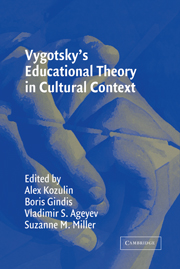Book contents
- Frontmatter
- Contents
- List of Contributors
- Series Foreword
- Introduction: Sociocultural Theory and Education: Students, Teachers, and Knowledge
- PART I CONCEPTS AND PARADIGMS
- PART II DEVELOPMENT AND LEARNING
- PART III SOCIOCULTURAL THEORY APPLICATION IN THE CLASSROOM
- PART IV DIVERSE LEARNERS AND CONTEXTS OF EDUCATION
- 16 Intrapersonal Communication and Internalization in the Second Language Classroom
- 17 Mediation in Cognitive Socialization
- 18 Cultural Modeling
- 19 The Relations of Learning and Student Social Class
- 20 Vygotsky in the Mirror of Cultural Interpretations
- Author Index
- Subject Index
- Titles in the series
- References
19 - The Relations of Learning and Student Social Class
Toward Re-“socializing” Sociocultural Learning Theory
Published online by Cambridge University Press: 05 June 2012
- Frontmatter
- Contents
- List of Contributors
- Series Foreword
- Introduction: Sociocultural Theory and Education: Students, Teachers, and Knowledge
- PART I CONCEPTS AND PARADIGMS
- PART II DEVELOPMENT AND LEARNING
- PART III SOCIOCULTURAL THEORY APPLICATION IN THE CLASSROOM
- PART IV DIVERSE LEARNERS AND CONTEXTS OF EDUCATION
- 16 Intrapersonal Communication and Internalization in the Second Language Classroom
- 17 Mediation in Cognitive Socialization
- 18 Cultural Modeling
- 19 The Relations of Learning and Student Social Class
- 20 Vygotsky in the Mirror of Cultural Interpretations
- Author Index
- Subject Index
- Titles in the series
- References
Summary
In his theory of mind, Vygotsky proposes three forms of mediation: tools, signs and symbols (semiosis), and social interaction. Most Vygotskian sociocultural research has focused on the semiotic form of mediation to address cognitive challenges in education. Whereas semiotic mediation relies on social interaction, and social interaction has often comprised the “unit of analysis,” the mediation of social interaction itself largely remains to be unpacked. Even though some studies have investigated the processes of cooperation or collaboration in learning, the dynamics of those processes as social relations have not received extensive examination in Vygotskian research. The mediation of social relations – the dynamics of power, position, social location in the social interaction of learning – is of profound significance in education. Nowhere is the importance of social relations in learning more evident than in the dynamics of social class in schooling.
Yet the dynamic of social relations has been shown to be central in the experience of failure for many low-income students, although literature on these relations has only rarely informed sociocultural studies in education. As researchers concerned with students' learning, sociocultural theorists need to examine the matter of social relations of those we study, for these social relations are a key mediator of students' school learning. Ideally, the perspective of sociocultural theory is able to integrate levels of analysis from the macrolevels of culture to the microlevels of social interaction and individual thinking and speech.
- Type
- Chapter
- Information
- Vygotsky's Educational Theory in Cultural Context , pp. 411 - 431Publisher: Cambridge University PressPrint publication year: 2003
References
- 18
- Cited by

